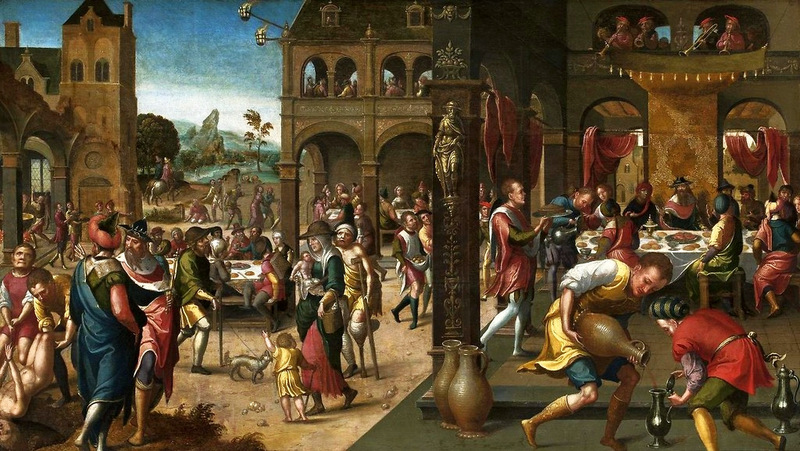Homily for 28th Sunday of Ordinary Time A, October 11, 2020
 Who doesn’t like to go to a wedding
reception? Who has ever had to turn down or be excused from a wedding
invitation?
Who doesn’t like to go to a wedding
reception? Who has ever had to turn down or be excused from a wedding
invitation?
My mother’s younger brother had a son and two daughters. The older daughter’s wedding was set for just about the time we were expecting the birth of our first child. We were disappointed but we were just not able to travel, so we could not attend. A year and a half later we were expecting our second child. My uncle’s younger daughter announced her wedding date. Again it was so very close to our due date that we could not attend her wedding either. A couple of years later we were expecting the birth of our youngest child. My uncle’s son announced his wedding date, and, you guessed it, we could not travel to attend that wedding because it was so near to our due date. To this day I don’t know if my uncle thought we were snubbing him.
In the Gospel passage today we see the king announcing a banquet for his son and he is snubbed by those he invited. If we look at the story behind the story we see the king represents God the Father and the son represents Jesus. The servants are the prophets and the invited guests represent the Israelites and the Jewish leaders. The banquet represents the kingdom of heaven.
The first invitation is to the Israelites, God’s chosen people, who ignore the invitation, that is, they ignore the prophets God has sent them. The second invitation is announced by John the Baptist and Jesus who are mistreated and killed by the Israelites and the religious leaders. The troops are the Roman occupiers who destroy the city of Jerusalem in 70 a. d. The final invitation is announced by the apostles and evangelists. "The servants went out into the streets and gathered all they found, bad and good alike, and the hall was filled with guests.” This invitation goes to everyone, all are called by God.
The “invitation” is God’s ever present call to us. It is the divine initiative to which we can either respond or ignore. Once we respond it calls for our participation. This brings us to the last character, the man not dressed in a wedding garment.
A casual reading of this verse has us asking the question: if he was called in from the street how would he already have a wedding garment? It seems like pretty harsh treatment for someone just because he didn’t have the proper clothing. A better understanding is that the garment “represents a converted life full of good deeds. Sinners are invited but are expected to repent. Believers are thus warned against complacency.” (New Jerome Biblical Commentary)
This passage began, “The kingdom of heaven may be likened to a king who gave a wedding feast for his son.” So that we don’t take these words too literally, Paul says in his letter to the Romans: “The kingdom of God is not a matter of food and drink, but of righteousness, peace, and joy in the holy Spirit; whoever serves Christ in this way is pleasing to God and approved by others. Let us then pursue what leads to peace and to building up one another.” Romans 14:17-19
What does that mean to us who call ourselves followers of Christ? In the Vatican II document, Constitution on the Church in the Modern World, the Council Fathers wrote:
Christians cannot yearn for anything more ardently than to serve the men of the modern world ever more generously and effectively. Therefore, holding faithfully to the gospel and benefiting from its resources, and united with every man who loves and practices justice, Christians have shouldered a gigantic task demanding fulfillment in this world. Concerning this task they must give a reckoning to him who will judge every [person] on the last day.
Are we living up to the invitation to the Kingdom of Heaven? Are we following Jesus’ command to love God with our whole being and our neighbor as our self? Are we using the Beatitudes as a guide for our behavior? Or, are we trying to enter the banquet without a “wedding garment?”
As we celebrate this Eucharist may we realize that “God will fully supply whatever [we] need, in accord with his glorious riches in Christ Jesus. To our God and Father, glory for ever and ever. Amen
No comments:
Post a Comment